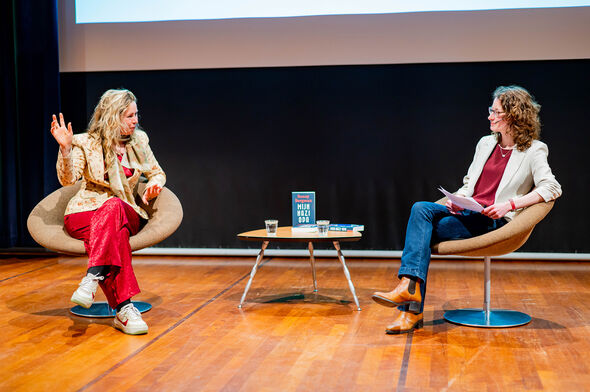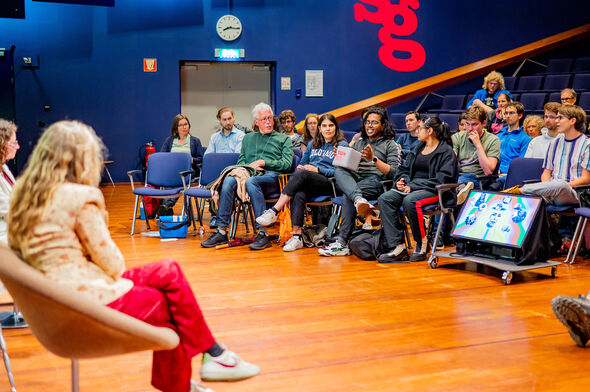
- Culture , People
- 11/05/2023
Sunny Bergman: “Recognize your subconscious prejudices”
She introduced the term sletvrees or "fear of being thought a slut" into the Dutch language and in her documentaries she confronts us with uncomfortable truths about racism and sexism. Her autobiographical book Mijn nazi-opa ("My Nazi Granddad") has recently been published. On Tuesday evening, program-maker, author and activist Bergman was a guest at TU/e. With an international audience she discussed the prejudices we all have, whether we know it or not.
As a documentary maker Sunny Bergman (1972) has enriched the national media archives in Hilversum with many TV clips that give us pause for thought. In the Blauwe Zaal on Tuesday evening many of them were screened, such as the scene from Zwart als roet (2014) (Black as Soot) in which Bergman and her intern, both fully made up as Zwarte Piet or Black Pete, hand out traditional Dutch pepernoten (tiny gingernut biscuits) in a London park, prompting shock and surprise among passersby.
“I thought it would be instructive to show how people outside the context of a Dutch St. Nicholas Day party respond to Zwarte Piet,” Bergman told her audience. The force of the reactions elicited during filming made her feel unsafe.
Aghast reactions were also evident among the TU/e audience during the screening of a subsequent clip, this one from Wit is ook een kleur (2016) (The Colour White), in which time and again young children from all kinds of cultural backgrounds are seen attributing negative attributes such as 'naughty' to a black baby doll, and positive ones to a white baby doll. “These are children under the age of six. They are mirroring the subconscious messages of our society because they aren't yet old enough to give socially acceptable answers.”
Weird
Bergman was on campus at the invitation of Studium Generale and TINT, to talk with interviewer Marle de Jonge and the audience about prejudices. She is currently promoting her new book, Mijn nazi-opa, about her father's father. A German mayor and prominent Nazi, this man raped Bergman's grandma, leaving her pregnant. In her book, Bergman investigates how having a scar like this in a family's history affects future generations.
In her oeuvre she often chooses to take her personal experiences as her starting point. “As a child I lived with my mother, step-father and brother on a boat. We grew our own vegetables and generated our own electricity, using a mill. This was all perfectly normal to me, but other people thought us weird, gypsy-like.”
As a legacy of this experience, Bergman always questions whatever the prevailing culture says is the acceptable standard. In Sletvrees? (2013), for example, she investigates why on the basis of the number of sex partners they have had, women like herself and men are judged very differently.
Uncomfortable
Internationals share this same outsider view of Dutch culture, and they were present in large numbers in the auditorium. Many shared their experiences.
Bergman asked about their first introduction to Zwarte Piet, and several spoke of feeling hugely uncomfortable. And of being struck by disbelief: how on earth could this be generally accepted in a country with a stellar reputation for being progressive?
Others shared experiences from their home countries. Someone from Portugal talked of their history lessons, and the emphasis put on the fact that Portugal was one of the first countries to abolish slavery. Not mentioned was the fact that it was also one of the first to start this extremely lucrative practice.
A visitor from India spoke of being discriminated against for having a skin color a fraction darker than other people's. This prompted Bergman to mention the Implicit Association Test, developed at Harvard by an Indian professor whom Bergman has met.
“This test registers your reaction speed while you're tasked with assigning either positive or negative attributes to either black or white people. Doing this brings to light your subconscious prejudices about skin color.”
Error
Shockingly enough, Bergman said, in her own test results, the professor in question was revealed to hold strongly racist views. She took the test repeatedly, with the same result. In vain she searched for the error in her test, and then she realized: however consciously I'm engaging with this theme, subconsciously I have taken on strongly racist ideas that are present in the Indian culture.
Something that plays a significant role among Dutch people, says Bergman, is that we believe that racism is very much something other people are guilty of, like people who vote for the nationalist, right-wing PVV party. And that we ourselves are definitely not racist. “This attitude prevents us from accepting the idea that everyone has prejudices, ourselves included. And that the institutional racism this gives rise to causes harm in our society.”
In view of this, Bergman advised all those present to look for the test online and to do it. “Because the first step is to recognize your own subconscious prejudices, so that you can make the conscious decision not to act on them.”




Discussion